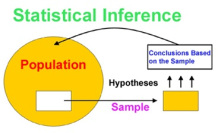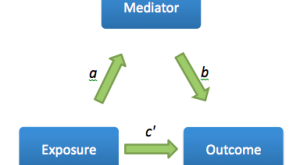Why the idea of causation cannot be a purely statistical one If contributions made by statisticians to the understanding of causation are to be taken over with advantage in any specific field of inquiry, then what is crucial is that the right relationship should exist between statistical and subject-matter concerns … Where the ultimate aim of research is not prediction per se but rather causal explanation, an idea of causation that is expressed in terms of...
Read More »Structural equation modelling (student stuff)
Structural equation modelling (student stuff) .[embedded content] This is a good introduction to some of the basic thoughts behind the use of SEMs. But — for the controversial question if SEMs really can be considered causal, yours truly highly recommends reading Kenneth Bollen’s and Judea Pearl’s Eight myths about causality and structural equation models.
Read More »Table 2 Fallacy (student stuff)
Table 2 Fallacy (student stuff) .[embedded content]
Read More »Discrimination and the use of ‘statistical controls’
The gender pay gap is a fact that, sad to say, to a non-negligible extent is the result of discrimination. And even though many women are not deliberately discriminated against, but rather self-select into lower-wage jobs, this in no way magically explains away the discrimination gap. As decades of socialization research has shown, women may be ‘structural’ victims of impersonal social mechanisms that in different ways aggrieve them. Wage discrimination is unacceptable. Wage...
Read More »Extreme events and how to live with them
Extreme events and how to live with them .[embedded content]
Read More »On the limits of ‘mediation analysis’ and ‘statistical causality’
“Mediation analysis” is this thing where you have a treatment and an outcome and you’re trying to model how the treatment works: how much does it directly affect the outcome, and how much is the effect “mediated” through intermediate variables … In the real world, it’s my impression that almost all the mediation analyses that people actually fit in the social and medical sciences are misguided: lots of examples where the assumptions aren’t clear and where, in any case,...
Read More »Causality and the need to reform the teaching of statistics
Causality and the need to reform the teaching of statistics I will argue that realistic and thus scientifically relevant statistical theory is best viewed as a subdomain of causality theory, not a separate entity or an extension of probability. In particular, the application of statistics (and indeed most technology) must deal with causation if it is to represent adequately the underlying reality of how we came to observe what was seen … The network we...
Read More »The elite illusion
.[embedded content] A great set of lectures — but yours truly still warns his students that regression-based averages is something we have reasons to be cautious about. Suppose we want to estimate the average causal effect of a dummy variable (T) on an observed outcome variable (O). In a usual regression context one would apply an ordinary least squares estimator (OLS) in trying to get an unbiased and consistent estimate: O = α + βT + ε, where α is a constant intercept, β a...
Read More »Why data alone does not answer counterfactual questions.
Why data alone does not answer counterfactual questions. .[embedded content]
Read More »What are the key assumptions of linear regression models?
What are the key assumptions of linear regression models? In Andrew Gelman’s and Jennifer Hill’s Data Analysis Using Regression and Multilevel/Hierarchical Models the authors list the assumptions of the linear regression model. The assumptions — in decreasing order of importance — are: 1. Validity. Most importantly, the data you are analyzing should map to the research question you are trying to answer. This sounds obvious but is often overlooked or ignored...
Read More » Heterodox
Heterodox





